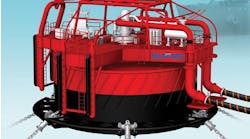Offshore staff
FLEKKEFJORD, Norway – There could be deficiencies on oil spill response (OSR) equipment systems used by certain offshore supply vessels, according to researchers in Norway.
Any spilled oil is recovered by OSR-equipped vessels and stored in tanks until it can be delivered to recovery stations onshore. The recovered oil must be heated to maintain a sufficient viscosity for offloading.
Parat Halvorsen, a specialist in steam-based OSR solution, performed trials of various systems using alternative lower-cost hot water coils. The company installed a compact heating coil and a steam injection nozzle in a test tank at its facilities in Flekkesfjord.
The tests, witnessed by representatives from shipbuilders, owners, consultants and the Norwegian Coastal Administration, measured performance of both solutions in water and in heavy oil. Empirical results showed that heat transfer in heavy oil using the hot water coil was only 10% of that achieved by the same coil in water, the company claimed.
“The results from the tests clearly showed that using a heating coil is not a viable option,” said Kim Kristensen of Parat Halvorsen’s Marine and Offshore division. “When we started the steam injection system, live temperature logging recorded the way the oil was evenly heated in a matter of minutes.
“Our advice to shipyards and owners is to exercize caution on OSR equipment selection, basing choices on correct, up-to-date information. We believe that the laws of physics are against hot water coil-based systems, particularly in cold, harsh weather conditions such as those in the North Sea.”
The Parat ORO multi nozzle arrangement is designed to heat the entire tank from one insertion point. Steam is supplied via an electrical boiler, approved for marine use by clasification societies including Germanischer Lloyd, Bureau Veritas, Det Norske Veritas, and Lloyd’s Register.
5/09/2013


